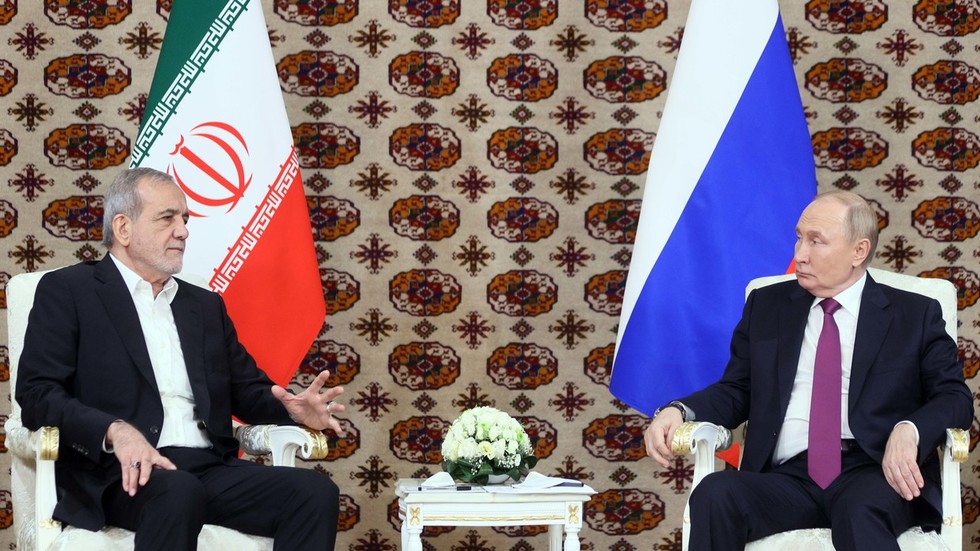The first official meeting between Russian President Vladimir Putin and Iranian President Masoud Pezeshkian marked a pivotal moment in the relationship between Moscow and Tehran, occurring within the context of an international forum in Ashgabat, Turkmenistan. This meeting was particularly notable as it was the inaugural engagement between the two leaders since Pezeshkian took office on July 30. According to Russian presidential advisor Yuri Ushakov, discussions at this meeting focused not only on bilateral relations but also on the rapidly escalating crisis in the Middle East. The timing of the summit was critical, coming just before a scheduled meeting at the BRICS summit, where Iran is a new member, indicating that further dialogue between the two leaders was imminent. Despite ongoing Western attempts to undermine Iranian-Russian cooperation, both leaders underscored their nations’ shared perspectives on numerous global issues.
The backdrop of the meeting saw the European Union’s decision to impose new sanctions against Iran amid accusations of missile transfers to Russia, which both nations have denied. Additionally, the U.S. tightened sanctions against companies connected to Iran’s oil trade, reacting to Tehran’s military actions in the region, particularly its missile strikes on Israel. These developments encapsulated a recurring pattern of the West’s approach, wherein nations are often pressured to align with U.S. interests under the threat of sanctions or military intervention. Despite Pezeshkian’s expressed willingness to negotiate with Western powers, there remains a skeptical outlook on the sincerity of Western policies, especially given the historical context of Iranian diplomatic relations and the perception that sanctions are a sign of Western weakness rather than strength.
While the meeting was brief, lasting about an hour, it was characterized as productive and significant in strengthening ties between the two countries. Pezeshkian accepted an invitation to visit Moscow officially, which speaks to the commitment both nations have towards deepening their collaboration in sectors such as energy, culture, and trade. Emphasizing the strategic nature of the Iran-Russia relationship, Pezeshkian outlined plans to accelerate crucial oil and gas projects, highlighting the importance of their partnership amid a complex geopolitical landscape. As both leaders recognized, the U.S. and Western nations seem disinterested in de-escalating conflicts in the Middle East, prompting Iran to seek solidarity with Russia and regional partners.
Analyzing the broader implications, analysts observe a potential “reset” in relations, primarily owing to Pezeshkian’s reformist stance and his attempts to reengage with the West through diplomatic channels, particularly with the possibility of reviving the nuclear deal. However, it is crucial to note that Pezeshkian’s administration does not envision prioritizing Western relations over those with Moscow or Beijing. Instead, he advocated for mitigating the impact of sanctions through stronger cooperation with neighboring countries, notably Russia, indicating a multi-faceted diplomatic strategy that integrates regional aspirations. This pragmatic approach suggests that despite facing pressure from the West, Iran remains committed to deepening economic and strategic ties with Russia.
The bilateral discussions also entailed reassessing economic engagements and initiatives, with both leaders noting an increase in mutual trade despite a significant drop in trade turnover from previous years. The anticipated operationalization of Russia’s Mir payment system in Iran is expected to enhance trade dynamics substantially. Following the latest meeting, Pezeshkian heralded a constructive partnership, outlining collaborative plans encompassing various sectors, including energy and infrastructure development. This cooperative spirit reflects a united front against external pressures, particularly sanctions imposed by Western nations.
In a key takeaway, the meeting between Putin and Pezeshkian can be seen as a reaffirmation of their nations’ commitment to a strategic partnership that promises considerable ramifications for both countries and broader geopolitical landscapes. The U.S. has openly expressed alarm regarding this growing alliance, signaling recognition of the dynamic shifts in the international order. As both nations continue to navigate an evolving political terrain, the collaboration between Russia and Iran appears poised to not only solidify their own bilateral interests but also to potentially realign regional alliances amid ongoing geopolitical strife, effectively establishing a formidable countermeasure to Western hegemony. The talks in Ashgabat signify a meaningful step towards a new axis of influence that could alter the pathways and outcomes of future international engagements.

